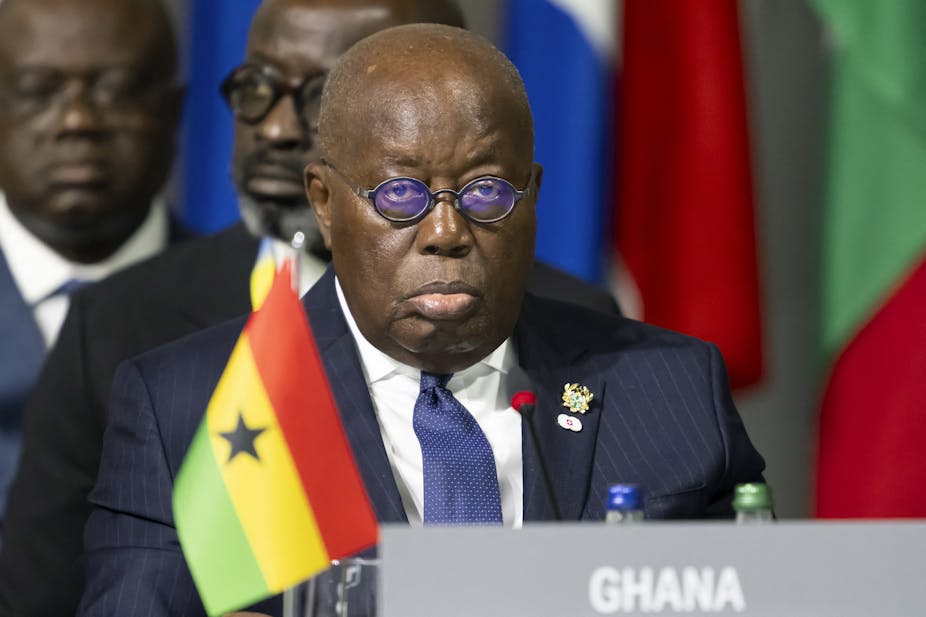
For the first time in seven years, Nana Addo Dankwa Akufo-Addo will end the year without Ghana’s presidency weighing on his shoulders. Ghana goes to the polls on 7 December. Whatever the outcome, Akufo-Addo has served two terms as president and will be retiring from a long political life.
Akufo-Addo became president in 2017 with a pedigree in both modern and traditional statecraft. Three of his relatives – Edward Akufo-Addo (his father), J.B. Danquah and William Ofori-Atta – were among the architects of Ghana’s first political party, the United Gold Coast Convention.
As a university student in the early 1960s, Akufo-Addo was known as a Trotskyite. But he eventually turned fully to his liberal political roots and affiliations. In the 1970s he aligned with opposition forces against then military leader Ignatius Kutu Acheampong. Akufo-Addo’s campaign to return Ghana to civilian led democratic constitutional rule continued in the 1980s against the dictatorship of Jerry Rawlings.
When Ghana returned to constitutional rule in the early 1990s, Akufo-Addo was one of those who formed the Danquah-Busia Club, a group started by 12 people who believed in the ideals of J.B Danquah. This later became a political party, the New Patriotic Party. It is one of the two parties that have governed Ghana since 1993 and produced two of the five presidents under the Fourth Republic. The New Patriotic Party is considered right wing.
As a scholar of political science, I have followed Akufo-Addo’s presidency with keen interest. He was expected to do more than his predecessors, and have a strongly positive economic and social impact on Ghana. But viewing his record, I argue that his presidency failed to live up to expectation.
The first term high
Akufo-Addo’s victory in 2016 came after two previous attempts, in 2008 and 2012, had ended in close losses to the National Democratic Congress.
He got off to a shaky start as president. His inaugural address plagiarised a speech by former American president George W. Bush. This was roundly condemned by Ghanaians, considering the presidential campaign had made a new era of competence one of its core messages.
Undeterred, his presidency seemed to get on with the job of steering Ghana to its long expected rapid economic transformation. On both the international and domestic fronts bold initiatives were announced and pursued.
“Ghana Beyond Aid” was made the central logic of the country’s interactions with its bilateral and multilateral partners at the international level. The idea was to transform Ghana’s economy from one of raw material production and exports to one based on manufacturing and high value services. Akufo-Addo promoted this idea vigorously, which enhanced Ghana’s international standing. One sign of its success was Ghana ending International Monetary Fund support in 2019. The success of the exit was mixed as Ghana’s economy was devastated by the COVID-19 pandemic in 2020.
On the domestic front, the Akufo-Addo presidency abolished fees at the senior secondary school level, allowing unprecedented numbers of young people to enrol. In the first six years of the policy, an average of 422,940 students were enrolled annually compared to an average of 260,490 annual enrolments for the last six years before the policy.
Economic concerns included employment for Ghana’s young people and the stability of the financial sector. His presidency tried to deal with these matters through policies such as 1District 1Factory, an industrialisation plan to promote manufacturing and create jobs.
He also initiated a banking sector clean-up, made necessary by bad business practices and the weak capital positions of many banks. This was controversial because some financial institutions were closed and people were laid off. But it stabilised Ghana’s financial sector.
The second term low
By the second term, the great hope surrounding Akufo-Addo seemed to be draining off. The COVID-19 pandemic reached Ghana in March 2020 – also an election year.
Akufo-Addo rose to the pandemic challenge by personally leading the policy responses. There were measures to deal with public health and to mitigate socio-economic impacts. Ghanaians were kept informed by regular television and radio addresses to the nation. But Akufo-Addo was caught wrong footed in critical areas such as vaccine production capacity and the dearth of health facilities.
The COVID-19 response also resulted in charges of nepotism and corruption.
Ghana went to the polls in December 2020. The results were devastating for the Akufo-Addo government. Its parliamentary majority was wiped out and a hung parliament was sworn in.
Matters were not helped when the Ghanaian economy plunged into its worst crises in a generation in 2022. Inflation reached 54.1% and debt default forced Ghana to return to the International Monetary Fund.
The government also instituted a domestic debt exchange programme with citizens who had invested in bonds. This was seen as harsh; pensioners picketed at the country’s finance ministry to salvage what was left of their lifelong earnings and savings.
The destructive impact of illegal mining on the environment across Ghana, and the abandoned site for the construction of a national cathedral in Accra, arguably provide some of the most sobering images of the presidential term’s disappointing outcomes.
In a sense the Akufo-Addo presidency became a victim of the high hopes it inspired. Or, worse, didn’t have the people to fulfil them.![]()
Lloyd G. Adu Amoah, Scholar of Political Science, University of Ghana
This article is republished from The Conversation under a Creative Commons license.


